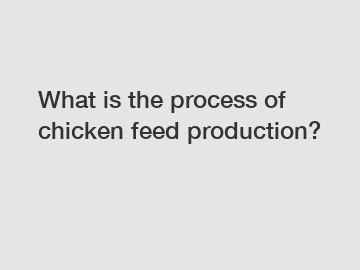What is the process of chicken feed production?
What is the process of chicken feed production?
Chicken feed is a crucial aspect of poultry farming as it directly impacts the health and growth of chickens. It is specially formulated to provide the necessary nutrients for chickens to thrive and produce quality eggs and meat. The production of chicken feed involves several steps, from selecting the ingredients to mixing and processing them into the final product. In this article, we will explore the process of chicken feed production in detail.
Ingredient selection.

The first step in chicken feed production is the careful selection of ingredients. Chicken feed typically contains grains, protein sources, vitamins, minerals, and fats. Common grains used include corn, wheat, and barley, while protein sources may include soybean meal or fishmeal. It is essential to choose high-quality ingredients that are free from contaminants and meet the nutritional requirements of chickens.
Grinding and mixing.
Once the ingredients are selected, they undergo grinding and mixing. Grinding is done to break down the larger grains into smaller particles, making it easier for chickens to digest. The ground ingredients are then mixed in the right proportions to create a balanced feed. This process ensures that all the essential nutrients are evenly distributed throughout the feed.
Pelletizing.
Pelletizing is the next step in chicken feed production. The mixed feed is pressed through a die to form cylindrical or pellet shapes. Pellets have several advantages, such as improved digestibility, reduced waste, and ease of handling and storage. Pelletizing also allows for the inclusion of certain additives or medications that can be incorporated into the pellets.
Cooling and drying.
After being pelletized, the feed undergoes a cooling and drying process. This step is essential to ensure that the pellets have the right moisture content for optimal storage and shelf life. Cooling is usually achieved by passing the pellets through a cooling chamber, while drying can be done using hot air or by allowing the pellets to air dry. The final moisture content should be carefully monitored and controlled.
Quality control and testing.
Throughout the production process, quality control and testing are vital to ensure the feed meets the necessary standards. Samples are regularly collected and analyzed for their nutritional content, moisture levels, and potential contaminants. This rigorous quality control helps guarantee that the feed is safe, nutritious, and will support healthy chicken growth.
Packaging and distribution.
Once the chicken feed has undergone quality testing, it is ready for packaging and distribution. The feed is typically packaged in bags or containers of various sizes for convenience. Clear labeling indicating the nutritional content, ingredients used, and storage instructions is essential. Proper storage and handling during transportation help maintain the feed's quality until it reaches the farmers and poultry producers.
Conclusion.
The process of chicken feed production involves several crucial steps, from ingredient selection to packaging and distribution. Each stage is carefully executed to ensure that the feed meets the nutritional requirements of chickens and supports their growth and well-being. Adhering to strict quality control measures and testing guarantees that the feed is safe and free from contaminants. With proper chicken feed, farmers can provide their poultry with the essential nutrients they need to produce high-quality eggs and meat.
For any further inquiries regarding chicken feed production or to learn more about our products, please feel free to contact us.
Want more information on animal feed coating machine, animal feed conveyor, Feed Cleaning Machine? Feel free to contact us.

Comments
0